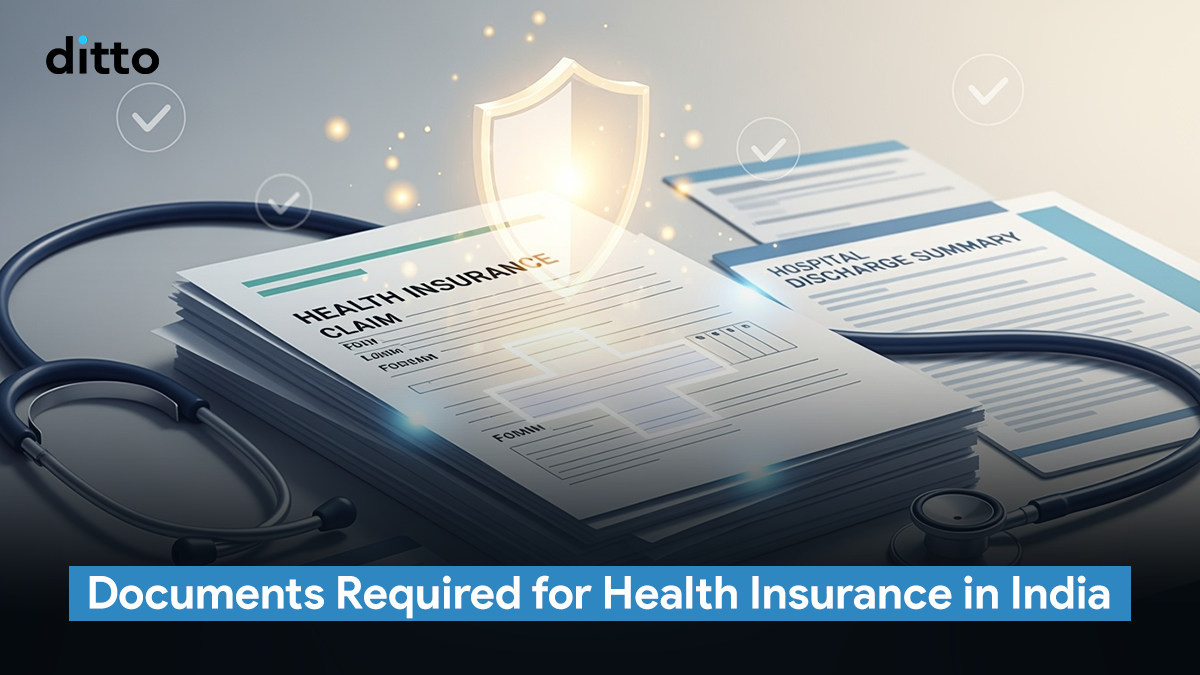Want to buy health insurance but not sure what documents you need?
You’re not alone. At Ditto, we frequently receive calls from customers asking which documents are required for both purchasing health insurance and filing claims. Simply put, you’ll need to submit basic identity and address proof (like Aadhaar, PAN, etc.) to get started with your policy purchase. You’ll also need additional paperwork, such as medical bills or hospitalization details, when filing cashless or reimbursement claims.
To clear all the confusion, we’ve broken down everything you need in this guide.
Looking to simplify the health insurance documentation process? Let Ditto handle it for you. Reach out to us today to get started.
What are the Documents Required for Buying a Health Insurance Policy?
1) Identity Proof
Under IRDAI’s KYC Master Directions, insurers must verify your identity and coverage amount to maintain records and ensure the proper management of your health insurance policy. Any government-approved Officially Valid Document (Aadhaar, PAN, Voter ID, Passport, or Driving Licence) is acceptable as per IRDAI KYC Master Directions.
Ditto’s Advice
2) Address Proof
Insurers require address proof to ensure accurate communication and coverage details. They usually differentiate between two types of address proof when considering your health insurance application:
a. Permanent Address (PRA): This refers to your hometown or native city/town/village and is linked to your ID documents. Common documents for PRA include:
- Aadhaar card
- Voter ID
- Passport
- Driving licence
Why is it needed?
To be used by default when your current address is unclear or not mentioned.
b. Communication/Residential Address (CRA): This is your current place of residence, especially if you’ve migrated to a metro or Tier-1 city for work. Accepted documents for CRA include:
- Rental agreement
- Bank statement
- HR letter showing your current address
Why is it needed?
- To check for hospital network access, third-party administrator (TPA) allocation, and cashless arrangements
- For demographic profiling and risk analysis (e.g., air quality, hospital infrastructure, disease incidence in that region)
- To allot premiums: If you are living in a tier-1 city (like Mumbai or Delhi), your premiums may be higher than the ones paid in a Tier-3 city (like a city in Uttar Pradesh or Bihar).
Note: Even if your PRA is in a Tier-3 city, your premiums will be calculated based on your CRA, which, if in a Tier-1 city, will attract higher premiums.
Points to Remember
“If you work in a different city, mention both your permanent and current address when buying insurance. No rent agreement? A bank statement or HR letter with your address works. If you move after getting the policy, inform your insurer to update your address and align your network hospitals,” Gaurav, a senior advisor at Ditto.
Did You Know?
3) Age Proof
Insurers usually require age proof to accurately analyze health risks and determine the appropriate premium for a policyholder.
The common documents include:
- Birth certificate
- Passport
- 10th or 12th mark sheet
- Aadhaar card
- Driving license
- Voter's ID
- PAN card
- Recent passport-size photograph(s) of all insured persons
Quick Note: Aadhar and PAN cards are the most commonly accepted forms of documents for age verification.
What if you want to add your newborn child to the policy?
The baby will not have an Aadhar card or PAN card at the moment. “In this case, the birth certificate will be considered as an all-in-one document,” says Swapnil, one of our senior advisors.
4) Passport-size Photographs
A few insurers may ask you for your passport-size photos at the time of purchase. In case of an online purchase, you will be asked to submit your photo as per the KYC records of your Aadhar or PAN card.
5) Income Proof (For High Value Policies or Floater Plans)
Insurers request income proof to analyze your financial stability and determine coverage limits or premium amounts. The commonly accepted documents are:
- Salary slip
- Form 16
- Income Tax Returns (ITR)
- Bank statement
Heads Up:
While Income proof isn’t mandatory or common for buying health insurance, the insurer may ask for it if:
- The premium amount is significantly high, or
- The sum insured exceeds a certain threshold (₹1 Cr+)
One of our customers living in Mumbai applied for a ₹2 crore family floater plan (4 members) with a 2-year premium of ₹1.5L+. Since it was a high-value policy, the insurer asked for salary slips and bank statements. The documents were shared, and the policy was issued immediately.
Did You Know?
6) Medical Reports
Insurers may ask for medical records or disclosures if:
- You declare any pre-existing conditions (e.g., diabetes, hypertension, thyroid, asthma)
- You have a history of major surgeries or hospitalization
- You are on long-term medications
Common documents requested in this case include:
- Hospital discharge summaries
- Doctor’s consultation notes or prescriptions
- Diagnostic test reports (e.g., HbA1c, ECG, USG, MRI, X-ray, etc.)
- Current medication list or treatment details
Note: Insurers often evaluate these documents to decide coverage terms, exclusions, or loadings.
7) Pre-policy Medical Tests
Based on specific criteria like age thresholds (commonly 45 or 50+ years), higher sum insured (₹25L and above), and lifestyle factors (like smoking or alcohol consumption),.you may be required to undergo pre-policy medical tests, like:
- Blood test (CBC, sugar, lipid profile, etc.)
- Urine test
- ECG or TMT
- Liver Function Test (LFT)
- Kidney Function Test (KFT)
- BMI, blood pressure, pulse rate
As per the IRDAI service-level norms, insurers must communicate test results within 15 days.
Bottom Line: While IRDAI does not mandate medical screening for every proposal, insurers may choose to get some tests done. The results are collected either via home visit or at approved diagnostic centers.
If the policy is issued after the test, the insurer bears the costs. If they give you a counter offer with loading charges and you reject it, the cost is deducted from your refund.
8) Proposal Form
This is a mandatory document provided by the insurer as a physical or online form that you must fill out accurately. It contains all personal, medical, and lifestyle-related details of the applicant(s), based on which the insurer evaluates the risk and issues the policy.
Quick Note: This is not an exhaustive list, as additional document requirements may vary based on the insurer’s underwriting.
What Are the Documents Required for Filing a Health Insurance Claim?
For cashless claims:
You’ll need your health card or policy number, a valid photo ID (like PAN, Aadhar, or Passport), and a pre-authorisation form from the hospital. As per the IRDAI Master Circular, insurers must respond to pre-authorisation requests within 1 hour and issue final authorisation within 3 hours after discharge.
The hospital also sends your treatment records, investigation reports, and final bills directly to the insurer or TPA. You won’t need to handle these documents yourself unless specifically asked.
For a reimbursement claim:
You’ll need to pay upfront and submit documents for review to get the amount reimbursed. This is helpful when you get treated at a non-network hospital or in emergencies where cashless isn’t available.
For a smooth claim process, keep these documents ready: filled and signed claim form, discharge summary, original hospital bills and receipts, medicine bills with prescriptions, and test reports. You’ll also need ID proof, policy document, health card, bank details (like a cancelled cheque), and in accident cases, an FIR or MLC number if listed in your policy wording.
At Ditto, we have a dedicated team of experts to guide you through the claim settlement process. Book a free call now if you need help with any claim or are unsure how to proceed.
Did You Know?
Why Consider Ditto for Health Insurance
At Ditto, we’ve assisted over 8,00,000 customers with choosing the right insurance policy. Why customers like Abhinav below love us:

- No-Spam & No Salesmen
- Rated 4.9/5 on Google Reviews by 15,000+ happy customers
- Backed by Zerodha
- 100% Free Consultation
You can book a FREE consultation. Slots are running out, so make sure you book a call now!
Key Takeaways
Proper documentation can help you avoid delays in purchasing health insurance policies or filing claims. So, make sure to:
- Provide accurate personal details and medical history for proper coverage.
- Submit required documents like ID proof, medical records, and income proof on time.
- Keep copies of all forms, policies, and communications for reference.
- Re-check if you have all the necessary documents for smooth claim processing.
Looking to simplify the health insurance documentation process? Let Ditto handle it for you. Reach out to us today to get started.
FAQs on Documents Required for Health Insurance
Can the Aadhaar Card be used as both identity and age proof for health insurance?
Absolutely. You can use your Aadhar card as an identity or age proof when applying for health insurance in India. Most insurers accept your Aadhar alongside other documents like a birth certificate, passport, or PAN card as proof of identity.
Is it possible to apply for health insurance without submitting all the required documents?
Unfortunately, no. You must submit the mandatory documents when applying for health insurance and for filing claims. Documents related to your identity proof, age proof, address proof, and any specific medical reports are standard prerequisites for both the issuance of the policy and for future claim settlement.
Last updated on:










